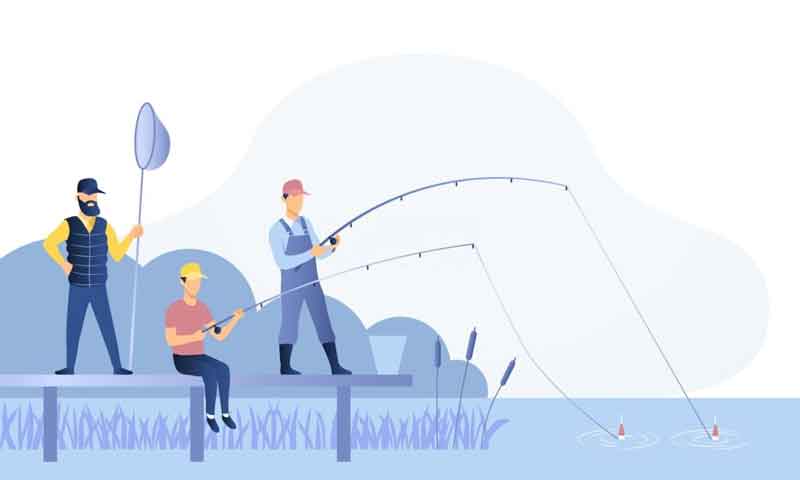Professional fishing is not for the faint-of-heart.
Just look at a TV-guide. Hop to the Discovery Channel and peek at the names of some of those shows.
Deadliest Catch, Wicked Tuna, Lobsterman: Jeopardy at Sea. These are not names that give the impression that life on a fishing vessel is easy.
However, if you want to become a professional fisherman, you have to start somewhere. So, we have made a little guide on just how to do that.
1. Just Get Yourself Out There.
Fishing is not the traditional job that you go to university for. You likely will not find many listings on online job sites either. Instead, fishing is a job that requires you to take the bull by the horns. You need to get off your couch and put your name in the mix.
Do some research first. Fishing is broken up into seasons. Different species of fish and other aquatic life are catchable around the year. It does not matter if it is heavy winter or mid-summer. There are fishing boats and fishermen with quotas year-round.
Find out where boats are docking at the start of a season and get to those places. That way, you can talk to experienced fishermen. They can point you in the direction of boats looking for greenhorns.
Greenhorns are people taken on with practically no experience. They are trained on the job. Being there in person likely gets you a chance.
2. Be Mentally Prepared
As an inexperienced greenhorn, you are expected to listen and do as you’re told. That is without exception.
On a fishing boat, there is no lower you can go than the greenhorn position.
You will be the butt of jokes. You will be pranked and tested mentally to see if you can handle the rigours of the job.
Getting a job on a boat puts you with new people. They may not necessarily like you, and you may not like them. The intensity of the work puts strains on relationships. Do not take it personally.
Remember, everyone else on that boat has experience. They have been in exactly the same spot as you. The treatment they are giving out is what they got when they started. It is like a rite of passage. Come through it, and you will be part of a unique community.
3. Ensure You are Physically Ready
Fishing is not an ordinary 9 to 5 job. Do not expect to be clocking-off and going home to a nice warm bed.
Take crab fishermen in Alaska, on the Bering Sea, as your most extreme example. Those who can handle it will be grinding away for weeks with little rest. When on good fishing, the toughest crews can go 24 hours or more on deck without sleep.
The task of fishing, hauling, separating the catch is repetitive. Your muscles will do the same thing over and over until they are at breaking point. Do not think you can go from couch potato to fisherman as if by magic.
Even those whose bodies have adjusted to the exertion will feel the burn.
4. Show Discipline
A lot can go wrong on a fishing boat. It is no exaggeration to say that people die.
Even experienced hands must be aware of what is going on at all times. There is dangerous equipment. Some of it could slice a hand-off. Some of it could crush a person in seconds.
On a fishing boat, you must be disciplined for your safety and the safety of others.
Discipline involves listening and learning. If you have not understood something, do not guess what is right. Clarify and be sure. Do not let people get hurt because you were wrong.
Routine greenhorn tasks will include preparing bait. Do it properly, exactly as shown. It seems simple, but you risk jeopardising the catch if you do it wrong. Time, money, and a crew’s patience will be lost.
5. Show a Desire to Work
Commercial fishing can be a lucrative enterprise for everyone on the boat. Understand that you will not be paid by the hour. Your pay depends on how much quota is caught and how quickly.
The longer a boat is out on the water, the more its costs rise. Rising costs equals less pay distributed around the crew.
As a greenhorn, you will be looking at the smallest cut. As you progress up the ranks, your percentage will get bigger. But you will not pass beyond greenhorn if you cannot work or choose not to.
Many greenhorns give up in the middle of their first trip. They just are not cut out for the manual labour and exertion of the job.
Some will make it through a trip on deck, but at a snail’s pace by the end.
If you really want to cut it as a professional fisherman, you must fight for it. Fight through the pain and tiredness. Try to do the job with as much gusto near the end of a trip as at the start.
Slowing down slows down the whole operation. It eats into everyone’s money. Who will want you back if you are taking money from their pockets?
Final Thoughts
Those are the five biggest tips we can give you about becoming a professional fisherman.
Fishing is not about what grades you got at school or whether you have the smarts.
To succeed, the main traits you need at the start are guts and determination. You need to have a can-do, never-say-die attitude. That way, when your body screams no, you can still work and prove your worth.
Everyone starts professional fishing from the lowest rung on the ladder.
It is physically demanding. It is mentally draining. Become a professional fisherman only if you can handle it.
Do not put your life, and the lives of others at risk, unless you are sure.
